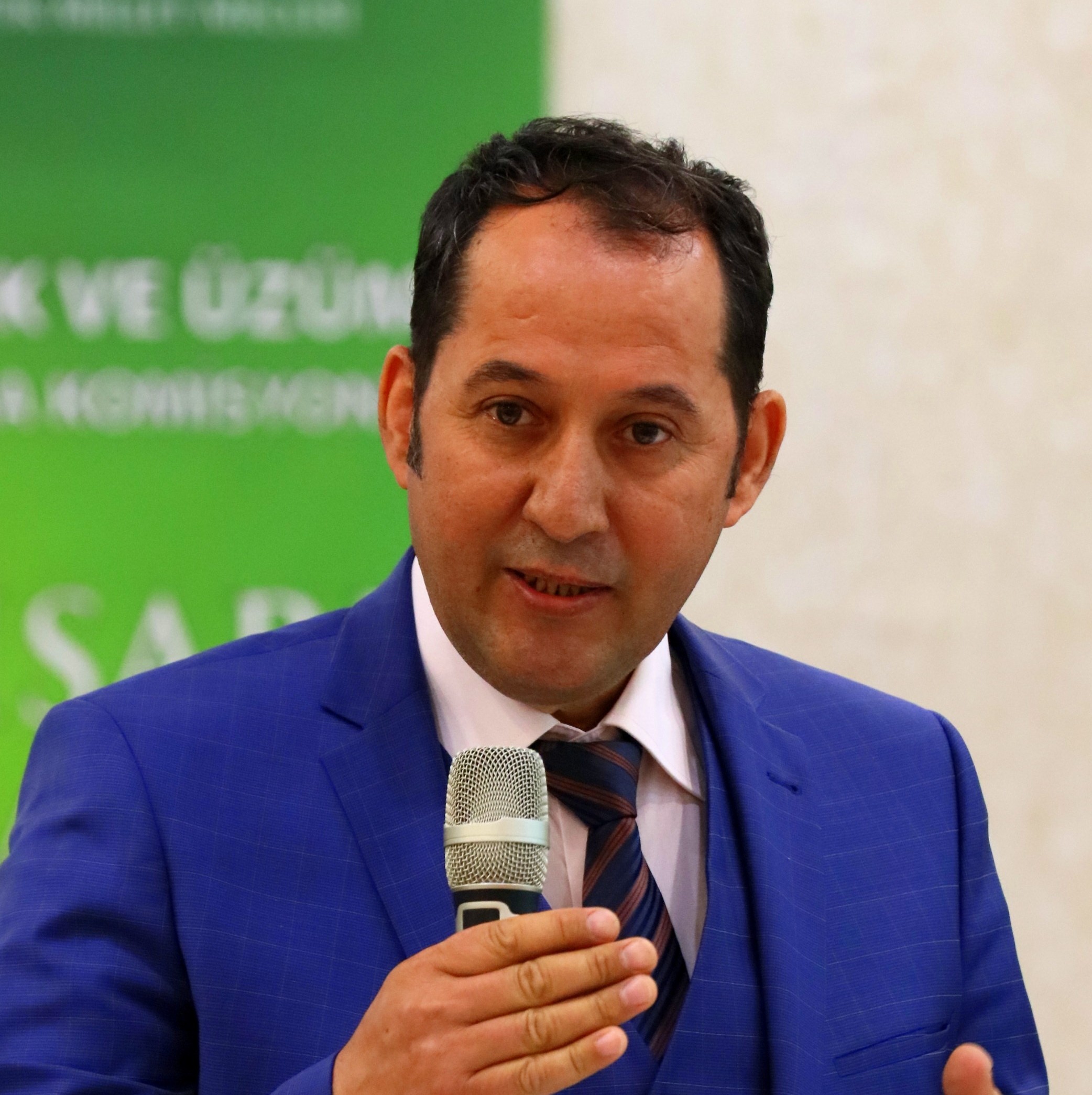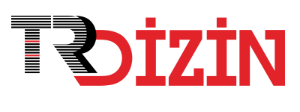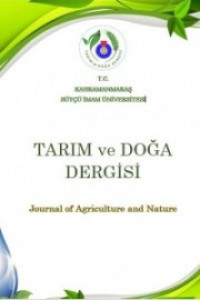Research Article
Issue Reviewers
 Web
Web












21.02.1965 yılında Tokat- Erkilet’te doğdu. İlk, orta ve lise öğrenimini Tokat’ın Pazar ilçesinde tamamladı. A.Ü. Ziraat Fakültesi Bitki Koruma Bölümünden 1988 yılında mezun oldu. 1990 yılında C. Ü. Fen Bilimleri Enstitüsü Bitki Koruma Ana Bilim Dalında Yüksek Lisans eğitimini tamamladı. Eşinin burslu öğrenci statüsünde Amerika Birleşik Devletlerinde bulunması nedeniyle 1990-1997 yılları arasında ABD’inde kaldı. Mayıs 1998’de Tokat Gaziosmanpaşa Üniversitesi, Ziraat Fakültesi Bitki Koruma Bölümünde öğretim görevlisi olarak göreve başladı. 2003 yılında G.O.P. Üniversitesi Fen Bilimleri Enstitüsü Bitki Koruma Ana Bilim Dalında doktora eğitimini tamamladı. 2008 yılında yardımcı doçent kadrosuna atandı. 2013 yılında doçentlik kadrosuna atandı, 2019 yılında profösörlük kadrosunu aldı. Halen Tokat Gaziosmanpaşa Üniversitesi Ziraat Fakültesi Bitki Koruma Bölümünde öğretim üyesi olarak çalışmaktadır. Evli ve 2 çocuk annesidir.











Isparta University of Applied Sciences, Faculty of Agriculture, Isparta, Türkiye


He graduated from Trakya University, Faculty of Agriculture, and Department of Soil Science in 1996 as head of the department. At the same year, he both started to M.S. in institute of natural and applied sciences in Trakya University and started to work as research assistant in Trakya University, Faculty of Agriculture, Department of Soil Science. He assumed title “MSc Engineer” in 1998 and “Ph.D” in 2004. He worked as research assistant in Trakya University, Faculty of Agriculture, Department of Soil Science between 1996 and 2007. He is still working as Assistant Professor in Namık Kemal University, Faculty of Agriculture, Department of Soil Science and Plant Nutrition since 2007.
He attended many conferences, meetings, courses, seminary, panels, workshops, congress and festivals at home and abroad. He was assigned to lecture for one week each within the context of Erasmus teaching staff mobility at Trakia Democritus University in Greece in 2011 and at University of Technology and Life Sciences in Poland in 2013. He was assigned for 3 months between 11 July and 11 October at “the University of Vermont” in Vermont-USA to take a part in a project called “use of soil earthworms in agriculture”. He was invited in November-December 2012 by the same university and attended some scientific collaborative studies in order to carry out projects about “vermicompost and soil earthworms” in the University of Vermont. He invited to many international-national conferences as a key speaker about his expert areas.
He served as project head and researcher in 29 projects supported by TÜBİTAK, Trakya University, Namık Kemal University, Nevşehir Hacı Bektaş Veli University, Bilecik Seyh Edebali University, TAGEM and Bozok University Scientific Research Projects Units. He has 115 articles on soil science, soil ecology, plant nutrition, soil fertility, soil chemistry, soil-water pollution, ecologic agriculture and fertilization topics as research articles and papers presented in domestic and abroad scientific meetings. Also, 30 of them are the articles published in international periodicals cited by international science indexes (SCI-SCI-Exp.). He won 12 months research scholarship at “The University of Vermont” in Vermont-USA for the second term of 2013 in the context of TUBITAK 2219 International Postdoctoral Research Scholarship Program. He studies the subjects about soil earthworms, vermicompost production from different organic wastes, set up and control of modern vermicompost production plants which are popular subjects all around the world recently.


Biography
(Dr. Mithat Direk from Selçuk University, Konya-Türkiye)
Mithat Direk ORCID number (0000-0002-7232-9089)
Official mail: mdirek@selcuk.edu.tr; mithatdirek@gmail.com
Official link in his university : https://selcuk.edu.tr/Person/Detail/mdirek
Dr. Direk received B.S. degree from Çukurova University in Adana, Türkiye. He got his MSc. and PhD. degrees in Agricultural Economy Department from the University of Çukurova in Adana, Türkiye also. He was the founding faculty member of the Department of Agricultural Economy, from the Sütçü İmam University, Kahramanmaraş, in Türkiye. He had worked Çukurova, Kahramanmaraş Sütçü İmam University, which was head of department of agricultural economics, Kahramanmaraş, Türkiye. He works in Selçuk University since 1997.
He worked as the director of the Taşkent Vocational Scholl at 6 years, in Taşkent, Konya, Türkiye. He was also a Visiting Professor one month at Tanta University, Egypt, 4 months North Dakota State University, USA, and he is visiting many of countries for research and technical subjects. He worked on international relationships, organizing conferences, supervising projects throughout the world. He was the author of the book entitled “Agriculture History” published in 2012 and second edition in 2014, which is a new concept in agriculture sector. He is the editor of the some book entitled conferences proceeding. These proceeding books brought new dimensions to agricultural sector and agro food industry. His current research interests include sustainable agriculture and food marketing. His interest of taking pictures as like amateur photographer and he was opened exhibition “Seasons in Taşkent” at 2001. He is as a writer of a number of books and more than 200 papers published in international journals and conference proceedings. He recently writes some popular articles in newspaper daily and monthly journal in Türkiye. He is also an organizer as well as chair series of International Conference on Sustainable Agriculture and Environment performed six times in different countries. He is an expert especially in agricultural marketing, organization, and cooperatives.


















 Web
Web
Bayburt’da 1966 yılında doğdu. İlk Okulu Rüştü Paşa İlk Okulunda, orta öğretimini Gazi Ahmet Muhtar Paşa Orta Okulunda ve Lise öğrenimini Erzurum Lisesinde tamamladıktan sonra yüksek öğrenimini Atatürk Üniversitesi Ziraat Fakültesi Toprak Bölümünde 1985-1989 yılları arasında tamamladı.
1990-1991 yılları arasında Yedek Subay Olarak askerlik hizmetini tamamladıktan sonra mezun olduğu bölümde Toprak Anabilim Dalı Toprak Verimliliği alanında 1991 yılında Sayın Prof. Dr. Yıldırım SEZEN danışmanlığında Yüksek Lisansa Başladı. Toprak Kimyası üzerine Mayıs 1994 tarihinde Yüksek Lisansını tamamladı.
Aynı yıl Eylül ayında Doktora sınavını, Ekim ayında ise Araştırma Görevlisi Sınavını Kazandı ve mezun olduğu bölüme Araştırma Görevlisi Olarak girdi.
1994 yılında Fen Bilimleri Enstitüsü tarafından verilen 1 yıl İngilizce kursuna tamamladı. 1995 yılında Toprak Ekolojisi Bilim alanında Sayın Prof. Dr. F. Tülay Kızıloğlu ALGAN danışmanlığında Toprak Mikrobiyolojisi Üzerine Doktora çalışmalarına başladı.
Ocak 2003 tarihinde Doktora çalışmasını bitirdi ve 2006 Yılında Yard. Doç. Dr. Kadrosuna atandı.
2008 yılında TÜBİTAK bursu ile ABD'de Ohio State Üniversitesinde 2,5 yıl süre ile ''Sera Gazları Üzerine Toprak İşlemenin ve Bitki Çeşitliliğinin Etkileri'' konusunda proje çalışmalarına katıldı. 2011 Yılında döndükten sonra Nisan Döneminde Doçentlik Sınavına başvuru yaptı. Ekim 2012 tarihinde YÖK tarafından Doçentlik kadrosunu aldı. 2018 Yılında Atatürk Üniversitesi Ziraat Fakültesi Toprak Bölümüne Bitki Besleme Anabilim Dalına Profesör olarak atandı..
Halen Atatürk Üniversitesi Ziraat Fakültesi Toprak Bölümünde Öğretim Üyesi olarak görevine devam etmektedir.









Aim & Scope
2022-JIF = 0.500, 2022-JCI = 0.170, ICV-2022: 71.05
Kahramanmaraş Sütçü İmam University Journal of Agriculture and Nature (Journal of Agricultural and Natural) accepts research articles on-line with the Open Journal System (OJS) and offers it to the stakeholders with unlimited accessibility of the articles in all issues. As it is known, Open Journal Systems increase the impact level of articles by providing more qualified viewing opportunities to all readers on a national and international scale compared to subscription and distribution systems. OJS systems are also easily available to researchers in terms of indexing, re-access, free access, duplication.
Our journal, which accepts articles at national and international level, has internationally accepted SCI-Expanded etc. It tries to fulfill the necessary conditions to be scanned in indexes such as Our journal has been indexed by the Web of Science and Emerging Sources Citation Index since 2017. Our journal, which will continue on its way within the framework of scientific and ethical rules in its next publication life, will provide you, esteemed scientists and readers, scientific research written in Turkish and English; The article will continue to be published as a note to the editor, review and research note.
The citations to be made by researchers to the articles published in our journal are very important for our journals to be scanned and accepted by national and international indexes.
Kahramanmaraş Sütçü İmam University Journal of Agriculture and Nature (Journal of Agricultural and Natural) is an international peer-reviewed journal and publishes original, new and scientific research articles in all fields related to Agriculture and Biology.
Author Guidelines
GUIDE FOR AUTHORS
· Journal of Agricultural and Nature Sciences is abstracted and/or indexed in: Emerging Sources Citation Index, TUBITAK-ULAKBİM, CAB Abstracts, CiteFactor, DRJI (Directory of Research Journal Indexing) and EBSCO.
· KSU J. Agric Nat. is an international, double-blind peer-reviewed, open-access journal, published by the Kahramanmaraş Sütçü İmam University. The journal invites original research papers containing new insight into any aspect of Agricultural and Biological Sciences that are not published or not being considered for publication elsewhere. Preliminary, confirmatory or inconclusive research, review articles, case and local studies and works presenting taxonomy will not be published.
· Before preparing papers for journal, authors should read through the Guide for Authors and consult a current issue to make themselves familiar with general journal format.
· The journal uses double-blind system for peer-review; both reviewers and authors’ identities remain anonymous. The paper will be peer-reviewed by two reviewers from outside and one editor from the journal typically involve in reviewing a submission. Authors will normally receive reviewers’ comments within 8 weeks of submission. Please note that authors do not pay any article submission or processing fee.
Manuscript Submissions
Manuscript should be submitted to journal’s online submission system by the corresponding author. All submissions should include following documents:
1) Title page with author names, titles, addresses and contact information (in Word format).
2) Manuscript (in Word format version 2003 or above). All author names, titles and affiliations should be excluded.
3) Transfer of Copyright Form. This form should be filled and signed by all authors and sent electronically as a scanned copy. Authors of the accepted papers should send the original version of this form.
4) Document showing the result of iThenticate (max. 20% match accepted).
5) Ethics Committee Approval (if needed).
Papers should be written with fluent English without any grammatical and typographical errors. Manuscripts with any of those errors will be rejected and sent back to the authors for corrections before submission and review. The font size used for the preparation of the manuscript must be 12 points with numbered lines, in the left-hand margin and double spacing throughout, i.e. also for abstracts, footnotes and references. All manuscript pages, including the title page, abstract, references, tables, etc. should be numbered consecutively. All margins width should be 3 cm. The tables and figures with captions should be placed after the text. Each figure and table should be referred in the text. Excessive use of italics to emphasize part of the text should be avoided.
To Submit
https://dergipark.org.tr/journal/2509/submission/start
Manuscripts should include the following sections;
· Title (short, specific and informative),
· Keywords (indexing terms, up to 6 items),
· Abstract (not exceeding 200 words ), - Introduction,
· Material and Methods,
· Results and Discussion,
· Conclusions,
· Acknowledgements (if needed),
· Abbreviations and Symbols (if needed),
· References, Figures and Tables with captions not exceeding 16 pages (with references). All headings and titles should be written in bold.
Acknowledgements
Acknowledgements should be brief at the end of the text and may include source of financial support. The contract number should be provided.
References
Cite references in the text as author‘s family name should be followed by the year of the publication in parentheses (Peter 2010; Basunia and Abe 2001). Use et al after the first author’s family name for citations with three or more authors (Lawrence et al 2001). For citations of the same authors published on the same year, letters after the year should be used (Dawson 2009a). References cited in the text should be arranged chronologically. The references should be listed alphabetically on author’s surnames, and chronological per author. Names of journals should be in full titles rather than the abbreviations. Avoid using citations of abstract proceedings. The following examples are for guidance.
Journal Articles
Kaygısız A 2013. Estimation of Genetic Parameters and Breeding Values for Dairy Cattle Using Test-Day Milk Yields. The Journal of Animal & Plant Sciences, 23(2): 345-349.
Ihsan Izzaddeen S, Kaygısız A 2018. Effect of Essential Oil of Laurel (Laurus nobilis L.) on Performance, Blood and Fecal Parameters of Holstein Calves during Suckling Period. Pakistan J. Zool. 50 (3) : 1087-1096.
Lawrence KC, Funk DB, Windham WR 2001. Dielectric moisture sensor for cereal grains and soybeans. Transactions of the ASAE 44(6): 1691-1696
Akpinar E, Midilli A, Biçer Y 2003a. Single layer drying behavior of potato slices in a convective cyclone dryer and mathematical modeling. Energy Conversion and Management 44(10): 1689-1705
Books
Mohsenin NN 1970. Physical Properties of Plant and Animal Materials. Gordon and Breach Science Publishers, New York
Book Chapter
Rizvi SSH 1986. Thermodynamic properties of foods in dehydration. In: M A Rao & S S H Rizvi (Eds.), Engineering Properties of Foods, Marcel Dekker, New York, pp. 190-193
Publications of Institutions / Standard Books
ASAE 2002. Standards S352.2, 2002, Moisture measurement - unground grain and seeds. ASAE, St. Joseph, MI
Internet Sources
FAO 2013. Classifications and standards. Retrieved in April, 12, 2011 from http://www.fao.org/economic/ess/ess-standards/en/
Thesis and Dissertations
Berbert PA 1995. On-line density-independent moisture content measurement of hard winter wheat using the capacitance method. Crandfield University, Graduate School of Natural and Applied Sciences, Department of Chemistry, PhD Thesis, (Unpublished), 78 pp, UK
Conference Proceedings (Full papers)
Yağcıoğlu A, Değirmencioğlu A, Çağatay F 1999. Drying characteristics of laurel leaves under different drying conditions. In: Proceedings of the 7th International Congress on Agricultural Mechanization and Energy, 26-27 May, Adana, pp. 565-569
Tables and Figures
Tables and Figures should be numbered consecutively and accompanied by a title at the top. All tables and figures should not exceed 16x20 cm size. Figures should have high resolution, minimum 600dpi in jpg format. For publication purposes use grayscale images. Avoid using vertical lines in tables.
Illustrations
Do not use figures that duplicate matter in tables. Figures can be supplied in digital format, or photographs and drawings, which can be suitable for reproduction. Label ach figure number consecutively.
Units
Units of measurement should all be in SI units. Use a period in decimal fractions (1.24 rather than 1,24). Avoid using “/”. Include a space between the units (m s-1 rather than m/s, J s-1 rather than J/s, kg m s-2 rather thankg m/s2 ). Units should have a single space between the number and the unit (4 kg N ha-1 , 3 kg m-1 s -2 , 20 N m, 1000 s-1 , 100 kPa, 22 °C). The only exceptions are for angular definitions, minutes, seconds and percentage; do not include a space (10°, 45’, 60’’, 29%). The abbreviation of liter is “L”.
Formulas and Equations
Number each formula with the reference number placed in parentheses at the end. Use Word mathematical processor for formulas with 12pt., variances in Italics, numbers and mathematical definitions in plain text. If needed, refer as “Equation 1” in the text (….the model, as given in Equation 1).
The name of the payee
The journal doesn’t have APC or any submission charges.
Ethical Principles and Publication Policy
Authors should provide a list of references, financial support; it should also be forbidden to publish same research in more than one journal.
Plagiarism
Plagiarism is defined as ‘submitting as one’s own work, irrespective of intent to deceive, that which derives in part or in its entirety from the work of others without due acknowledgement. It is both poor scholarship and a breach of academic integrity.
Examples of plagiarism include copying (using another person’s language and/or ideas as if they are one’s own), by:
• quoting verbatim another person’s work without due acknowledgement of the source;
• paraphrasing another person’s work by changing some of the words, or the order of the words, without due acknowledgement of the source; • using ideas taken from someone else without reference to the originator;
• cutting and pasting from the Internet to make a pastiche of online sources;
• submitting someone else’s work as part of one’s own without identifying clearly who did the work. For example, not attributing research contributed by others to a joint project.
Plagiarism might also arise from colluding with another person who has not been declared or acknowledged (i.e. where collaboration is concealed or has been forbidden). Work should include a general acknowledgement where it has received substantial help, for example with the language and style of a piece of written work.
Plagiarism can occur in respect to all types of sources and media, including:
• text, illustrations, musical quotations, mathematical derivations, computer code, etc.;
• material downloaded from websites or drawn from manuscripts or other media;
• published and unpublished material, including lectures, presentations and grey literature.
KSU J. Agric Nature do not tolerate plagiarism in any of our publications, and we reserve the right to check all submissions through appropriate plagiarism checking tools. Submissions containing suspected plagiarism, in whole or part, will be rejected. If plagiarism is discovered post publication, we will follow our guidance outlined in the Retractions, Corrections and Expressions of Concern section of these guidelines. We expect our readers, reviewers and editors to raise any suspicions of plagiarism, either by contacting the relevant editor or by emailing dogabilimleri@ksu.edu.tr
Research with Humans or Animals
Research involving humans or animals should be approved by relevant ethics committee(s) and should conform to international ethical and legal standards for research. We also expect authors to respect human participants’ right to privacy, and to gain any necessary consent to publish before submitting to us. For information on whether authors are required to submit or include evidence regarding the above, please consult individual journal submission guidelines or contact the relevant book or journal editor.
Conflicts of Interest and Funding
KSU J. Agric Nature try to ensure that any Kahramanmaraş Sütçü İmam University Press publication is free from undue influence. Authors submitting a book or journal manuscript to Kahramanmaraş Sütçü İmam University Press, editors and reviewers of Kahramanmaraş Sütçü İmam University Press publications, are required to declare any potential conflicts of interest that could interfere with the objectivity or integrity of a publication. Conflicts of interest are situations that could be perceived to exert an undue influence on the presentation, review and publication of a piece of work. These may be financial, non-financial, professional, contractual or personal in nature. We also expect that anyone who suspects an undisclosed conflict of interest regarding a work published or under consideration by Kahramanmaraş Sütçü İmam University Press should inform the relevant editor email dogabilimleri@ksu.edu.tr. Many of our publications require the inclusion of a funding declaration in addition to a conflicts of interest declaration. Please check with the relevant journal or book editor regarding declaration requirements.
Libel, Defamation and Freedom of Expression
Freedom of expression is critical to us as academic publishers, but we do not support publishing false statements that harm the reputation of individuals, groups, or organizations. KSU J. Agric Nature’s legal team can advise on pre-publication libel reviews, and will also address allegations of libel in any of our publications.
Retractions, Corrections and Expressions of Concern
KSU J. Agric Nature’s editors will consider retractions, corrections or expressions of concern in line with COPE’s Retraction Guidelines. If an author is found to have made an error, the journal will issue a corrigendum. If the journal is found to have made an error, they will issue an erratum. Retractions are usually reserved for articles that are so seriously flawed that their findings or conclusions should not be relied upon. Journals that publish Accepted Manuscripts may make minor changes such as those which would likely occur during typesetting or proofreading, but any substantive corrections will be carried out in line with COPE’s Retraction Guidelines. In the case of books, if someone raises a legal, ethical or security concern about a Kahramanmaraş Sütçü İmam University Press publication, we would inform the author(s) and editor(s) involved. Our next step would be to investigate the concern and, if appropriate, address it through dialogue or negotiation with any third parties involved or by referring it to a relevant institution for investigation. If the concern relates to the integrity or accuracy of the content itself, we would consider issuing a correction, or a retraction and withdrawal from sale. Where any content is retracted, we would do so in a way that still preserves the integrity of the academic record and of other affiliated works (for example, other volumes in a series). This includes maintaining any associated metadata and, if legally possible, the abstract. We also participate in CrossMark; a multi-publisher initiative to provide a standard way for readers to locate the current version of a piece of content, view any changes that have occurred, and access additional information about that publication record.
Falsification, Fabrication and Image Manipulation
Where research data are collected or presented as images, modifying these images can sometimes misrepresent the results obtained or their significance. We recognise that there can be legitimate reasons for modifying images, but we expect authors to avoid modifying images where this leads to the falsification, fabrication, or misrepresentation of their results.
Fraudulent Research and Research Misconduct
Where we are made aware of fraudulent research or research misconduct by a Kahramanmaraş Sütçü İmam University Press author, our first concern is the integrity of content we have published. We work with the relevant editor(s), COPE, and other appropriate institutions or organizations, to investigate. Any publication found to include fraudulent results will be retracted, or an appropriate correction or expression of concern will be issued. Please see the Retractions, Corrections and Expressions of Concern section of these guidelines for more information.
Versions and Adaptations
KSU J. Agric Nature are distributed in many different global cultural, environmental and economic contexts. We may therefore issue different versions of some of our products in order to cater to these contexts. We neither modify existing, published content nor originate new materials to meet political or ideological requirements where we judge these to compromise the quality, effectiveness or factual accuracy of the materials or to conflict with our Code of Ethics. We grant licenses in volume and subsidiary rights to third-parties which permit the reproduction, reuse or adaptation of our content in different contexts, languages and territories. Where we license volume rights, we and our authors retain the right to withhold approval for publication if we have concerns about the integrity and accuracy of the licensed edition.
Transparency
KSU J. Agric Nature strive to follow COPE’s Principles of Transparency and Best Practice in Scholarly Publishing and encourage our publishing partners to uphold these same principles.
Data and Supporting Evidence
We support transparency and openness around data, code, and other materials associated with research. We expect authors to maintain accurate records of supporting evidence necessary to allow others to understand, verify, and replicate new findings, and to supply or provide access to this supporting evidence, on reasonable request. Where appropriate and where allowed by employer, funding body or others who might have an interest, we encourage authors to deposit data in a suitable repository or storage location, for sharing and further use by others. Kahramanmaraş Sütçü İmam University Press aims to provide authors with the ability to connect supporting data with their manuscripts, either on our own platform or through third party services. Kahramanmaraş Sütçü İmam University Press is also a signatory of Transparency and Openness Promotion (TOP) Guidelines. Please contact individual journals for information on their transparency requirements.
Integrity of Record
We maintain a record of the existence of everything we publish with information (metadata) describing each publication. If our content is deemed not to comply with the laws of a sovereign nation, we make every effort to ensure the metadata remain accessible within that jurisdiction. Where we are obliged to alter the publication record in any way, such as in the case of research misconduct leading to retraction of a publication, we preserve the academic record as far possible. See the Retractions, Corrections and Expressions of Concern of these guidelines for information about how we do this. We apply these same principles to our marketing, and do not modify or manipulate the representation of the academic record in our marketing activities. When any product (chapter, article, book or journal) is purchased or subscribed to, we supply it only in its totality to the customer, who is not entitled to alter its content in any way that is inconsistent with the licensing terms under which it was published. Any sale of disaggregated products is subject to the contracts with the copyright holders of the original products.
Open Access Policy
The Journal of Agriculture and Nature is a completely free, international peer-reviewed journal with open access. It does not charge article processing fees (evaluation fees or printing fees) and subscription fees for accessing articles.
Privacy Statement
Personal information such as names and e-mail addresses entered in the management system of the Journal of Agriculture and Nature will be used only for the scientific purposes of this journal. This information will not be used for any other purpose or section and will not be shared with third parties.
Archiving
All articles published in the Journal of Agriculture and Nature are stored and presented on ULAKBİM servers in pdf format through the TÜBİTAK ULAKBİM Life Sciences Database.
Sponsorship and Advertising
The Journal of Agriculture and Nature does not accept sponsorship and advertising in terms of publishing policies.
Copyright Transfer
Manuscripts submitted to the Journal of Agriculture and Nature for publication should be original work that has not previously been published in any way or that has not been submitted for publication elsewhere.
Authors agree to waive the copyright of their work and submit the copyright of their work to the Journal of Agriculture and Nature upon submission for evaluation.
The Editorial Board of the Journal of Agriculture and Nature is authorized to publish the article. Authors who will send a work to the Journal of Agriculture and Nature should fill in the "Copyright Transfer Form". The author (s) must sign the completed form with a wet signature. By scanning the signed form, uploading additional files in the 4th of the work submission steps through the system option. The works of authors who do not submit the Copyright Transfer Form are not published.
Fair double-blind peer-review and Evaluation Process
Blind peer-review is a method used for the publication of scientific publications with the highest quality. This method is the basis of the objective evaluation of scientific studies and is preferred by many scientific journals.
The opinions of the peer reviewers have a decisive role in the publication quality of the Journal of Agriculture and Nature. All studies submitted to the Journal of Agriculture and Nature are evaluated through blanking according to the following stages.
The Journal of Agriculture and Nature uses the double-blind method in the evaluation process of all studies. In the double-blind method, the author and peer reviewer identities of the studies are hidden.
Initial Evaluation Process
The articles submitted to the Journal of Agriculture and Nature are first evaluated by the editors. At this stage, studies that do not meet the aim and scope of the journal, which are weak in terms of language and expression rules in Turkish and English, that contain scientifically critical errors, have no original value and do not meet the publication policies are rejected. Authors of rejected studies are notified within two weeks of the submission date. Appropriate studies are sent to a Department editor for preliminary evaluation.
Preliminary Evaluation Process
In the pre-evaluation process, the editors of the department examine the introduction, materials and methods, findings, conclusions, evaluation and discussion sections in detail in terms of journal publication policies and scope and originality. Not eligible as a result of this review
The studies are returned within 4 weeks at the latest with the evaluation report of the department editor.
Arbitration Process
The works are sent to the peer reviewers according to their content and peer reviewer’s specialties. The editor of the department, who reviewed the study, proposes at least two peer reviewers from the peer reviewer pool of the Journal of Agriculture and Nature, or new peer reviewers appropriate to the area of the study.
It may suggest. The suggestions of the peer reviewers from the department editor are evaluated by the editors and the works are forwarded to the peer reviewers. The peer reviewers have no process and guarantee that they will not share the document.
Peer reviewer Evaluation Process
The time given to the peer reviewers is 4 weeks. Corrections from peer reviewers or editors must be completed by the authors within 1 month. Peer reviewers may review the corrections of a study to determine its suitability or may request multiple corrections if necessary.
Evaluation Result
The opinions of the peer reviewers are reviewed by the Department editor within 2 weeks at the latest. As a result of this review, the Department's editor communicates the final decision on the work to the editors.
Decision of the Editorial Board
The editors prepare the opinions of the editorial board based on the opinions of the editor and the peer reviewer. The opinions prepared are forwarded by the editor to the author (s) within 1 week at the latest, together with the suggestions of the Department editor and the peer reviewer. In this process, studies with negative opinions are returned without requesting plagiarism.
Article Submission
The author (s) who will send a study to be evaluated in the Journal of Agriculture and Nature can submit a membership to the journal management system at https://dergipark.org.tr/ksudobil.
If the author (s) notices a misstatement or error related to the published, early appearance or evaluation work, the editor of the journal for the withdrawal
There is an obligation to cooperate.
Withdrawal of Articles
The author (s) wishing to request a withdrawal of his / her work during the evaluation phase are obliged to forward the petition containing the request for withdrawal of the article, signed and scanned with the signature of each author, to the editorial board via dogabilimleri@ksu.edu.tr via e-mail. The Editorial Board reviews the withdrawal notification and returns within one week at the latest. Authors cannot send their manuscript to another journal for evaluation unless the request for withdrawal of the works whose copyrights have been transferred by the editorial board of the Journal of Agriculture and Nature is submitted.
Editors
Agriculture and Nature Journal editorial board; in case of suspicion of copyright and plagiarism regarding a published, published or evaluation work, it is obliged to initiate an investigation of the work.
In the event that the editorial board determines that copyright and plagiarism have been made in the evaluation process as a result of the investigation, it withdraws the study from the evaluation and returns the identified cases to the authors in detail.
If the editorial board determines that a copyrighted or plagiarism has been committed in a published or published work, it shall perform the following withdrawal and notification procedures within one week at the latest.
ETHICAL RESPONSIBILITIES and POLICIES
Publication Ethics The publication processes used in the Journal of Agriculture and Nature are the basis for the development and dissemination of information in an impartial and respectable manner. The processes applied in this direction are directly reflected in the quality of the work of the authors and the institutions supporting the authors.
Peer reviewerd studies are the studies that embody and support the scientific method. At this point, it is important that all stakeholders of the process (authors, readers and researchers, publishers, peer reviewers and editors) comply with standards for ethical principles. Within the scope of the publication ethics of the Journal of Agriculture and Nature, all stakeholders are expected to bear the following ethical responsibilities.
The ethical duties and responsibilities set out below are based on guidelines and policies published by the Committee on Publication Ethics (COPE) as open access.
Ethical Responsibilities of Authors
The author (s) submitting works to the Journal of Agriculture and Nature are expected to comply with the following ethical responsibilities:
• The works submitted by the author (s) are expected to be original. If the author (s) make use of or use other studies, they must cite and / or cite in a complete and accurate manner.
• People who do not contribute intellectually to the content of the study should not be mentioned as authors.
• The situations and relationships of any work submitted for publication that may constitute a conflict of interest should be explained.
• Raw data on the manuscripts of the manuscripts may be requested from the author (s) within the framework of the evaluation process, in which case the author (s) should be prepared to submit the expected data and information to the editorial board and the scientific committee.
• The author (s) must have a document showing that they have the rights to use the data used, that they have the necessary permissions for the research / analysis, or that the consent of the test subjects has been obtained.
• The author (s) have an obligation to cooperate with the editor to inform, correct or withdraw the editor or publisher if he / she discovers a mistake or error related to his / her published, printed or evaluation work.
• Authors cannot keep their work in the application process of more than one journal at the same time. Each application may be initiated following the completion of the previous application. The study published in another journal cannot be sent to the Journal of Agriculture and Nature.
• It is not possible to change the author responsibilities (such as adding author, changing the order of author, removing the author) of a study that has started the evaluation process.
Ethical Duties and Responsibilities of Editors
The editors and department editors of the Journal of Agriculture and Nature have the following ethical duties and on the basis of the COPE Code of Conduct and Best Practice Guidelines for Journal Editors and Practice COPE Best Practice Guidelines for Journal Editors published by the Committee on Publication Ethics (COPE). should have responsibilities:
Relations with the readers
Editors should make decisions based on the knowledge, skills and experience expectations of all readers, researchers and practitioners. To contribute the published works to readers, researchers, practitioners and scientific literature and to be original should pay attention. In addition, editors are obliged to take into account the feedback from readers, researchers and practitioners, and to provide explanatory and informative feedback.
Relations with authors
The duties and responsibilities of the editors against the authors are as follows:
• Editors should make positive or negative decisions based on the importance, original value, validity, clarity of expression, and the objectives and objectives of the journal.
• The studies that are in compliance with the publication scope should be taken to the pre-evaluation stage unless there is a serious problem.
• Editors should not ignore favorable peer reviewer proposals unless there is a serious problem with the work.
• New editors should not change the decisions made by the previous editor (s) for the work, unless there is a serious problem.
• "Blind Judging and Evaluation Process" must be published and editors should avoid deviations from the defined processes.
• Editors should publish a Author's Guide that includes every topic that is expected by the authors in detail. These guides should be updated periodically.
• Authors should be provided with explanatory and informative notification and return.
Relations with Peer Reviewer’s
The duties and responsibilities of editors against peer reviewer’s are as follows:
• designate the peer reviewers according to the subject of the study.
• It is obliged to provide the information and guides that the peer reviewers need during the evaluation phase.
• The authors and peer reviewers have to observe whether there is a conflict of interest.
• In the context of blanking arbitration, the peer reviewer’s identity information should be kept confidential.
• Encourage peer reviewers to consider working in an objective, scientific and objective language.
• Evaluate the peer reviewers with criteria such as timely return and performance.
• Develop policies and practices to improve the performance of peer reviewers.
• Take the necessary steps to dynamically update the peer reviewer pool.
• Prevent disrespectful and unscientific assessments.
• Take steps to ensure that the peer reviewer pool is composed of a wide range.
Relations with editorial board
Editors should ensure that all editorial board members proceed with the publication policies and guidelines. The editorial board should inform its members about the publication policies and keep them informed of developments. New editorial board members educate, provide the information they need.
Relations with magazine owner and publisher
The relationship between editors and publisher is based on the principle of editorial independence. As per the written agreement between the editors and the publisher, all decisions of the editors are independent of the publisher and the journal owner.
Editorial and blind arbitration processes
Editors; The journal is obliged to implement the "Blind Arbitration and Evaluation Process" policies in the publication policies. In this context, the editors ensure that the fair, impartial and timely evaluation of each work is completed.
Quality assurance
Editors; is responsible for the publication of each article published in the journal in accordance with journal publishing policies and international standards.
Protection of personal data
Editors; and to ensure the protection of personal data relating to the subjects or visuals involved in the studies evaluated. Unless the express consent of the individuals used in the studies is documented, it is responsible for rejecting the study. In addition, editors; The author is responsible for protecting the individual data of the peer reviewers and readers.
Ethics committee, human and animal rights
Editors; to ensure the protection of human and animal rights in the studies evaluated. Ethics committee approval of the subjects used in the studies is responsible for rejecting the study in the absence of permission for experimental research.
Measure against possible abuse and misconduct
Editors; is obliged to take measures against possible misconduct and misconduct. In addition to conducting a rigorous and objective investigation into the identification and evaluation of complaints, the editor is also responsible for sharing findings.
Protection of intellectual property rights
Editors; to protect the intellectual property rights of all published articles and to defend the rights of journal and author (s) in case of possible violations. In addition, editors are required to ensure that the content of all published articles does not infringe the intellectual property rights of other publications.
measures.
Complaints
Editors; The author is obliged to examine the complaints coming from the peer reviewers or readers carefully and to respond in an illuminating and explanatory manner.
Political and Commercial Concerns
The owner, publisher and any other political and commercial elements do not affect the independent decision-making of the editors.
Ethical Responsibilities of Peer reviewers
The evaluation of all studies with "Blinding Peer reviewer" directly affects the quality of the publication. This process provides confidence through objective and independent evaluation of the publication. The evaluation process of the Journal of Agriculture and Nature is carried out with the principle of double-blinded arbitration.
The peer reviewers cannot contact the authors directly. Reviews and comments are communicated through the journal management system. In this process, peer reviewer comments on evaluation forms and full texts are forwarded to the author (s) through the editor. In this context, peer reviewers evaluating the work for the Journal of Agriculture and Nature are expected to have the following ethical responsibilities:
• Only work related to the field of expertise should accept the evaluation.
• Evaluate in neutrality and confidentiality.
• If he thinks that he is facing a conflict of interest during the evaluation process, he should refuse to review the study and inform the journal editor.
• Dispose of the studies they review in accordance with the principle of confidentiality after the evaluation process. They can only use the final versions of the studies they have reviewed after they are published.
• Evaluate objectively in relation to the content of the study. Nationality should not allow gender, religious beliefs, political beliefs and commercial concerns to influence assessment.
• Evaluate in a constructive and gentle language. Do not make humiliating personal comments that include hostility, slander and insult.
• Carry out the work they accept to evaluate in a timely manner and with the above ethical responsibilities.
Conflicts of interest
Editors; it ensures that the publication of the manuscripts is completed independently and impartially, taking into account conflicts of interest between the author (s), the peer reviewers and other editors.
Plagiarism Control
In accordance with the publication ethics of the Journal of Agriculture and Nature, it is obligatory that plagiarism audits are carried out in order to protect the integrity of all studies that have passed through the Blind Arbitration Assessment Process ". Within this scope, the Turkish and English copies of each study are subject to plagiarism control by a company approved by the editorial board. The material responsible for the audit belongs to the author (s). Plagiarism is controlled by Turnitin and iThenticate software. Each work is analyzed in-depth by means of software, and the matching and citation matches are extracted. The remaining matches are examined and the errors are detected and reported to the editorial board. The editorial board makes the final decision about the study in the light of the plagiarism audit report of each study. Errors in the report may be requested to be corrected by the authors or the work may be returned to the authors.
Bibliography, Submission and Citation Control
Scientific research is based on previous studies. In the studies conducted, reference is made to the previous studies within the framework of certain rules and references. Mistakes made intentionally or unknowingly in scientific studies undermine the reliability of the study and publication. The Journal of Agriculture and Nature sees it as imperative that accurate and complete references and citations are accepted as a result of the evaluation. Within this scope, after each work is accepted, a bibliography, sending and citation control is carried out by a company that the editorial board deems appropriate. The material responsibility for the control carried out belongs to the author (s).
The bibliography, submission and citation control of accepted studies are carried out for the full text in Turkish and English in the following steps:
• Bibliography is prepared in accordance with the procedures and principles contained in APA's Citation Guidelines 6th Edition.
• It is checked whether the references in the text of each reference in the bibliography are given according to the procedures and principles, and the wrong ones are corrected.
• References to in-text references are checked. The missing ones are requested from the authors and the wrong ones are corrected. Procedures and principles of Turkish references for full text and English for full text are taken into consideration.
Layout and Typesetting
The Journal of Agriculture and Nature requires the uniformity of the articles, their readability and the standard and uniform print format required by the standards. In this context, plagiarism audit and bibliography editing are completed by a company whose page layout and layout is approved by the editorial board. The responsibility for the preparation of the page layout and print copy rests with the author (s).
Giving the DOI Number
The Digital Object Identifier (DOI) is a unique access number that allows the identification and access of each published work electronically. A DOI number is mandatory for each study published in the Journal of Agriculture and Nature or in an early appearance. Plagiarism audit, bibliography check and print version are prepared by the editorial board after the acceptance stage.
Price Policy
Free submission and publication.
International Peer Reviewed Journal
Free submission and publication
Published 6 times a year
KSU Journal of Agriculture and Nature
e-ISSN: 2619-9149
